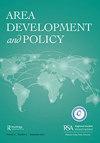Coalitions and urban transformation: contributions and limits
IF 1.8
Q3 DEVELOPMENT STUDIES
引用次数: 0
Abstract
ABSTRACT Diana Mitlin assesses the contributions of reform coalitions for more inclusive and equitable urban outcomes. This commentary examines three aspects of Mitlin’s arguments. First, it elaborates on the nature of knowledge that coalitions catalyse, suggesting that this could contribute to building a theory of practice on coalitions and city-making. Second, it examines the nature of the transformations coalitions seek to achieve emphasizing the generation of a transformative politics that seeks to democratize governance systems rather than one focused solely on material outcomes. Third, it interrogates the structural limits of what coalitions can achieve in the contemporary moment. The commentary draws from the author’s own experience of Indian cities.联盟与城市转型:贡献与局限
摘要Diana Mitlin评估了改革联盟对更具包容性和公平的城市成果的贡献。这篇评论从三个方面考察了米特林的论点。首先,它阐述了联盟所催化的知识的性质,表明这有助于建立关于联盟和城市建设的实践理论。其次,它考察了联盟寻求实现的变革的性质,强调了一种变革性政治的产生,这种政治寻求使治理系统民主化,而不是仅仅关注物质成果。第三,它质疑了联盟在当代所能达到的结构极限。这篇评论取材于作者对印度城市的亲身经历。
本文章由计算机程序翻译,如有差异,请以英文原文为准。
求助全文
约1分钟内获得全文
求助全文

 求助内容:
求助内容: 应助结果提醒方式:
应助结果提醒方式:


